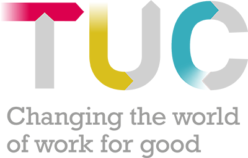Technology is transforming pretty much every area of our economy and society. Digital is now the mainstream choice for day-to-day interactions, raising expectations and making new choices possible every day.
Adapting to this new environment is crucial for any organisation that wants to continue to exist, let alone thrive. The TUC Digital Lab aims to help unions do just that.
New expectations
More than eight in ten (86%) of British adults now use the internet every day. And a similar number (87%) have a smartphone. For under 35s nearly everyone is an instinctive internet user with the vast majority using it on their mobile, throughout the day, from wherever they are.
This broad base of internet users, coupled with ease of access, has meant an explosion in start-up services. Agile new entrants have risen to market dominance in just a few years. Uber may be an atrocious corporate citizen, but they’ve gone from 0 to 3.5million user accounts in London alone, changing the landscape for a whole industry.
And as individuals have become able to research and publish more widely than ever before, power has shifted from companies to consumers and has raised customer expectations everywhere.
Those organisations that are acutely focused on the needs of their users, and able to rapidly test and optimise what they do, or understand where they need to change path, are the ones who are succeeding.
New approaches
There are a growing set of project management methods growing around the concept of “digital transformation”, focused on reinventing the services an organisation offers, through small scale, iterative digital projects, with heavy focus on user research, testing and analytics.
Unions are not as far ahead as employers, government or many voluntary organisations in using digital transformation to modernise the ways we work.
There are a lot of reasons behind this. The diversity of our movement means we’ve got uneven levels of digital capacity, and different approaches to IT. We’re always conscious that we’re spending our members’ hard earned money, and that can make us risk-averse when it comes to new investments.
Existing technical staff are often focused more in traditional IT and comms functions and can find it hard to keep their skills up to date. We have a huge base of activists, but not always the tools and processes to make use of their skills and interests more effectively.
There’s also little shared digital infrastructure across the movement, meaning costs for smaller unions in particular can be prohibitive.
New challenges
This is all costing unions an opportunity to work faster and more efficiently. It’s also putting us increasingly out of step with mainstream member (and prospective member) expectations in how they want to interact with us.
That leaves us potentially looking less relevant, and more vulnerable to disruptive new entrants coming into our space. We know unions are the best and most sustainable route to building worker power, but if working people perceive other options as better fitting the ways they naturally work, everyone stands to lose.
If our unions were starting out today, our values would be the same, but our structures, services and ways of working could be very different. The challenge for us as incumbents in our space is to adapt aspects of our operations that have served us well in the past, to make them relevant to the new environment.
That’s not to say there isn’t a lot of good work being done in unions. There is. We’ve seen great things in the recent years:
UNISON have built joining processes that match modern expectations, and improved organising intelligence for the union and its branches. Prospect are welcoming new members in ways that help them get more engaged. The National Education Union (NEU) have been trialing distributed organising and campaigning methods. And Public and Commercial Services Union (PCS) are automating and streamlining processes to free up staff and reps for the important work they want to.
Scratch pretty much any union and you’ll find good digital work going on. As a movement, our problem is a lot less about good practice than it is about common practice. Learning from what we’re all doing isn’t always being shared as effectively as it could be.
The Digital Lab
So to help focus some of these conversations, we’re launching a new Digital Lab initiative from the TUC. It’ll have a number of core activities:
Firstly, we’re devising strategic principles for unions in approaching digital transformation. With members of the TUC’s Executive Committee and colleagues from across a wide range of unions, we’ve been looking into the challenges facing us in digital at a strategic level, and making practical suggestions on how unions might respond. This will always be work in progress, but look out for our first drafts coming soon.
We’re going to run a series of best practice workshops throughout the year, linking unions together around the good work being done inside the movement and externally. These will be focused on areas of core activity for unions, such as organising, member engagement, balloting, and more.
We’ll run a small number of pilot projects, working in joint teams with TUC and affiliate union staff, to tackle particular problems, and at the same time build our practitioners’ experience in the new digital disciplines. Developing a research library and design patterns could help unions get a head start in those aspects of work that we all need to be doing.
We want to benchmark and measure unions’ digital transformation. We’ll update our 2017 self-assessment Digital Healthcheck tool for 2019’s environment, but also look into where unions are across the board on their systems, strategies and skills.
The offering from the Digital Lab will need to be flexible to offer value to a diverse group of unions. A strong focus at first will need to be around building a network and better understanding the needs of particular unions. If you want to hear more as we go, you can subscribe to follow our updates by email.
We are going to be reaching out to people at affiliates over the coming weeks and making new contacts. But if you have ideas, interests, or work that we need to see, please do get in touch.

